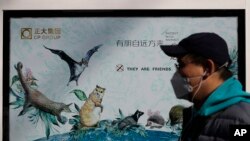Illegal wildlife markets could be consigned to the dustbins of history within five years amid a public outcry over their capacity to spread disease, and a widespread belief that the trade at least contributed to the coronavirus pandemic.
It’s a sentiment that has been backed by a survey by the World Wildlife Fund and strategic consultants GlobeScan, covering five key markets in East Asia, where consumption from illegal wildlife markets remains prevalent.
Matt Hunt, chief executive officer at Save the Bears in Cambodia, said massive change would occur in how people live as a result of the pandemic and said such surveys should back government efforts to shut down illegal wildlife markets.
“All it takes is the political will,” he said, adding that such markets could be consigned to history within three to five years if politicians were prepared to act.
“These are centuries-old habits, so change isn’t going to come overnight, but I think for sure we could be looking at a four- to five-year target or even a three-year target to really try and knock the illegal wildlife trade on the head,” he said.
Researchers surveyed 5,000 people in Hong Kong, Japan, Myanmar, Thailand, and Vietnam, and about 90 percent were “very likely” or “likely” to support government efforts in shutting illegal and unregulated markets trading in wildlife.
Marcus Hardtke, a Cambodia-based environmentalist, said that would go a long way toward protecting endangered species that are hunted in the wild.
“The snares, they hunt with snares mostly, and they just grab everything, endangered, not endangered, and most of the animals die in these snares before they are even found so they are really death traps and it’s a total complete waste.
“Without the market that would to a large extent stop. There would still be subsistence hunting but it’s still the market that drives the greater demand,” he said.
Almost 80 percent of respondents believed closing illegal and unregulated wildlife markets would be “very or somewhat effective” in preventing future pandemics.
It also found that 9 percent knew someone who had purchased wildlife products in the last 12 months and that 38 percent believed wild animals were the primary cause behind the coronavirus. Sixty-three percent believe illegal wildlife is one of the top two causes of the pandemic.
Topping the list were birds, followed by snakes, bats, civet cats, pangolins and turtles.
“Chinese researchers have suggested the virus might have come through the traditional Chinese medicine of using bat feces for eye ointment,” David Olsen, conservation director for WWF, said in regard to the coronavirus.
He also said illegal wildlife markets could be closed swiftly.
“People throughout the region are genuinely concerned about pandemics, and they do understand the link between the wildlife trade and the emergence, the spillover, transmission of infectious disease, also that they support governments taking action against high-risk situations.
“Pandemics can emerge from the wildlife trade, and if we want to continue engage in selling high-risk wildlife in high-risk situations, we’re just putting ourselves at risk again.”
In Thailand, Vietnam and Hong Kong, about half the respondents said the spread of human disease headed their concerns, with pollution and climate change third and fourth -- although the economy was also a prominent concern in Hong Kong, given the current protests.
The spread of human disease was an equal concern alongside climate change at 26 percent each in Japan, followed by terrorism. But in Myanmar, the use of wild animals and plants was the greatest worry, COVID-19 was second and climate change third.
Support for illegal wildlife markets was almost nonexistent. Just 2 percent of respondents said they were not worried at all about these markets.
However, people surveyed were divided on trust issues. Less than 45 percent trusted governments to follow through on what they regard as a very important issue. Fewer still trusted fellow citizens when it came to dealing with the outbreak of diseases such as COVID-19.
Hardtke added that markets would eventually close because traders in illegal wildlife were also facing supply shortages with too many forests now bereft of wildlife.
“Ultimately it has to happen because the resource is just no longer there and if you look at the hunting pressure in the protected areas of the forests in the region, it’s just crazy,” he said.
“They call it the empty forest syndrome because there’s simply nothing left anymore. You can walk around for a long time and you don’t hear or see anything.”









